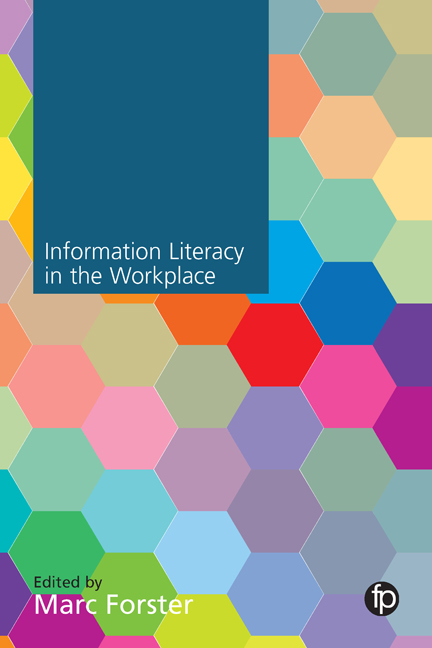Book contents
- Frontmatter
- Contents
- Figures and tables
- Contributors
- Foreword
- 1 Information Literacy and the workplace: new concepts, new perspectives?
- 2 How is Information Literacy experienced in the workplace?
- 3 Information Literacy and the personal dimension: team players, empowered clients and career development
- 4 From transaction to transformation: organizational learning and knowledge creation experience within Informed Systems
- 5 Virtuality at work: an enabler of professional Information Literacy
- 6 Determining the value of Information Literacy for employers
- 7 Information Literacy's role in workplace competence, ‘best practice’ and the ethics of professional obligation
- 8 Learning within for beyond: exploring a workplace Information Literacy design
- 9 Developing information professional competences in disciplinary domains: a challenge for higher education
- 10 The ‘hidden’ value of Information Literacy in the workplace context: how to unlock and create value
- 11 The ‘Workplace Experience Framework’ and evidence-based Information Literacy education
- References
- Index
4 - From transaction to transformation: organizational learning and knowledge creation experience within Informed Systems
Published online by Cambridge University Press: 08 June 2018
- Frontmatter
- Contents
- Figures and tables
- Contributors
- Foreword
- 1 Information Literacy and the workplace: new concepts, new perspectives?
- 2 How is Information Literacy experienced in the workplace?
- 3 Information Literacy and the personal dimension: team players, empowered clients and career development
- 4 From transaction to transformation: organizational learning and knowledge creation experience within Informed Systems
- 5 Virtuality at work: an enabler of professional Information Literacy
- 6 Determining the value of Information Literacy for employers
- 7 Information Literacy's role in workplace competence, ‘best practice’ and the ethics of professional obligation
- 8 Learning within for beyond: exploring a workplace Information Literacy design
- 9 Developing information professional competences in disciplinary domains: a challenge for higher education
- 10 The ‘hidden’ value of Information Literacy in the workplace context: how to unlock and create value
- 11 The ‘Workplace Experience Framework’ and evidence-based Information Literacy education
- References
- Index
Summary
This chapter will discuss:
• an organizational approach known as Informed Systems, which builds learning conditions and knowledge creation experiences that result in a workplace which uses information effectively to learn, adapt and perform.
Introduction
This chapter describers the Informed Systems approach to building organizational learning conditions and knowledge creation experiences through effective workplace communication systems and information practices. Informed Systems, which has its roots in relational Information Literacy (IL) (see Chapter 2), integrates constructivist learning, systems thinking and knowledge creation theories to advance ‘Informed Learning’, the experience of using information to learn, within constructed workplace ecosystems. Activated as action research and enacted through participatory co-design, this approach focuses on collective inquiry to further learning relationships and Informed Learning experiences (i.e. advances both information and learning experiences simultaneously). Associated professional practices facilitated by both technology- and human-enabled workplace communication systems guide the experience of using information to learn. Such experiences are amplified by dialogue and reflection, to foster knowledge creation for ‘learning in action’. Central to the Informed Systems approach is nimble thought leadership and collaborative information-focused activities, customizable to changing local situ - ations that foster Informed Learning capacity in the contemporary workplace.
In this chapter, workplace IL is understood to be the experience of using information to learn, in the tradition of the relational approach to IL. In The Seven Faces of Information Literacy and Informed Learning, Bruce (1997; 2008) presents insights into the experience of using information to learn through a relational approach. The early research results include four principles integral to the relational view and seven faces (facets or categories) representing qualitatively different ways of experiencing the use of information to learn. In depicting the phenomenon as a whole, these principles and categories represent an integration of experiential, contextual and transformational information experiences, which departed from the predominant behavioural research and skills-based education in vogue when she released her findings.
- Type
- Chapter
- Information
- Information Literacy in the Workplace , pp. 41 - 56Publisher: FacetPrint publication year: 2017
- 5
- Cited by



